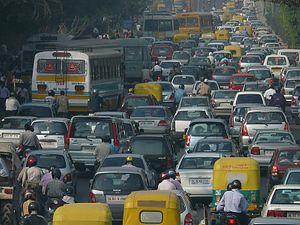When U.S. President Donald Trump pulled out of the Paris climate accord, declaring that he felt that it was bad for the United States, he also implied that it unfairly advantaged countries like India and China. This has not gone down well with India, which has spent the week since reiterating its own commitment to the global battle against climate change.
While India has plans in the pipeline for expanded coal production to meet growing energy requirements, it also has commitments to shift to renewables as 40 percent of its energy requirements by 2030. Both India and China had also agreed to compromises and a review of environmental targets on a five-year basis. Trump’s decision to pull out has not taken New Delhi by surprise, but the targeted comments have provoked a strong reaction, especially ahead of Prime Minister Narendra Modi’s scheduled visit to the United States.
Environment Minister Harsh Vardhan was quick to respond, saying that India will hold fast to its commitments irrespective of the stances of other nations across the world. He also reiterated that Modi had provided leadership at the Paris summit and would continue to do so regarding climate change and global warming.
Regarding Trump’s implications that India signed the Paris Climate Agreement for monetary benefits, External Affairs Minister Sushma Swaraj issued a public denial. Stating that India’s commitment to environmental protection has a long-standing traditional and historic basis, she said that India would stand by the deal whether or not the United States sticks to it. Union Home Minister Rajnath Singh further expressed hope that the Trump administration would rethink the move, and said that nations must stop acting in their own self interest when environmental concerns were at play.
While India is estimated to be the third largest polluter in the world, taking into account emissions, the United States and China take the first two spots. As Trump backs out of the accord, citing an unfair burden upon the United States, the leaders of China and India have renewed their promises. However, in this process, while Modi has indirectly referred to Trump’s jabs, no direct reference has been made to the advisability of the U.S. decision.
Modi, in response to questions about his position on Trump’s stance, has instead said that irrespective of Paris, India always has and always will do its bit to protect future generations. Lightly stating that he had reiterated this promise prior to public comments on this issue by others, Modi implied that Trump’s position on climate change and Paris is irrelevant to India.
Environmental organizations in India have in the meanwhile been uproariously angry over the U.S. decision to quit the accord. They worry that the significant cut to foreign aid related to climate change would make the shift to renewables even harder than it already is for India. The Center for Science and Environment (CSE) in New Delhi has said that the battle was already uphill and that with United States pulling out, the implications for the planet could be deadly. CSE also said that with such significant funding cuts, the accord might even fail entirely.
In the week since, Trump’s decision has pushed the political elite in India to make climate change commitments an important part of the agenda in the national conversation. In the wake of how much harder the battle just became for developing nations, it is imperative that these public promises translate into policy and not dissolve into mere political posturing.

































